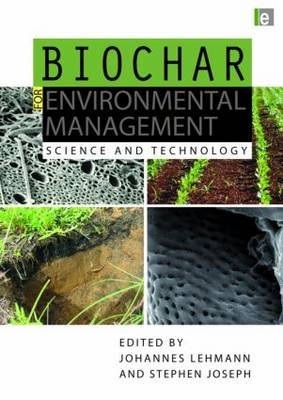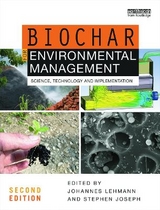
Biochar for Environmental Management
Earthscan Ltd (Verlag)
978-1-84407-658-1 (ISBN)
- Titel erscheint in neuer Auflage
- Artikel merken
Biochar is the carbon-rich product when biomass (such as wood, manure or crop residues) is heated in a closed container with little or no available air. It can be used to improve agriculture and the environment in several ways, and its stability in soil and superior nutrient-retention properties make it an ideal soil amendment to increase crop yields. In addition to this, biochar sequestration, in combination with sustainable biomass production, can be carbon-negative and therefore used to actively remove carbon dioxide from the atmosphere, with major implications for mitigation of climate change. Biochar production can also be combined with bioenergy production through the use of the gases that are given off in the pyrolysis process.
This book is the first to synthesize the expanding research literature on this topic. The book's interdisciplinary approach, which covers engineering, environmental sciences, agricultural sciences, economics and policy, is a vital tool at this stage of biochar technology development. This comprehensive overview of current knowledge will be of interest to advanced students, researchers and professionals in a wide range of disciplines.
Johannes Lehmann is associate professor of soil biogeochemistry and soil fertility management at Cornell University, USA, Co-founder and Chair of the Board of the International Biochar Initiative, and member of the editorial boards of Nutrient Cycling in Agroecosystems and Plant and Soil. Stephen Joseph is a visiting professor at the School of Materials Science and Engineering at the University of New South Wales, Australia, and Vice Chairman and Co-founder of the International Biochar Initiative.
Preface
Foreword by Tim Flannery
1. Biochar for Environmental Management: An Introduction
2. Physical Properties of Biochar
3. Characteristics of Biochar: Microchemical Properties
4. Characteristics of Biochar: Organo-chemical Properties
5. Biochar: Nutrient Properties and Their Enhancement
6. Characteristics of Biochar: Biological Properties
7. Developing a Biochar Classification and Test Methods
8. Biochar Production Technology
9. Biochar Systems
10. Changes of Biochar in Soil
11. Stability of Biochar in Soil
12. Biochar Application to Soil
13. Biochar and Emissions of Non-CO2 Greenhouse Gases from Soil
14. Biochar Effects on Soil Nutrient Transformations
15. Biochar Effects on Nutrient Leaching
16. Biochar and Sorption of Organic Compounds
17. Test Procedures for Determining the Quantity of Biochar within Soils
18. Biochar, Greenhouse Gas Accounting and Emissions Trading
19. Economics of Biochar Production, Utilization and Greenhouse Gas Offsets
20. Socio-economic Assessment and Implementation of Small-scale Biochar Projects
21. Taking Biochar to Market: Some Essential Concepts for Commercial Success
22. Policy to Address the Threat of Dangerous Climate Change: A Leading Role for Biochar
Index
| Erscheint lt. Verlag | 12.3.2009 |
|---|---|
| Verlagsort | London |
| Sprache | englisch |
| Gewicht | 1021 g |
| Themenwelt | Naturwissenschaften ► Biologie ► Ökologie / Naturschutz |
| Naturwissenschaften ► Geowissenschaften ► Geologie | |
| Technik ► Elektrotechnik / Energietechnik | |
| Technik ► Umwelttechnik / Biotechnologie | |
| Weitere Fachgebiete ► Land- / Forstwirtschaft / Fischerei | |
| ISBN-10 | 1-84407-658-X / 184407658X |
| ISBN-13 | 978-1-84407-658-1 / 9781844076581 |
| Zustand | Neuware |
| Informationen gemäß Produktsicherheitsverordnung (GPSR) | |
| Haben Sie eine Frage zum Produkt? |
aus dem Bereich



